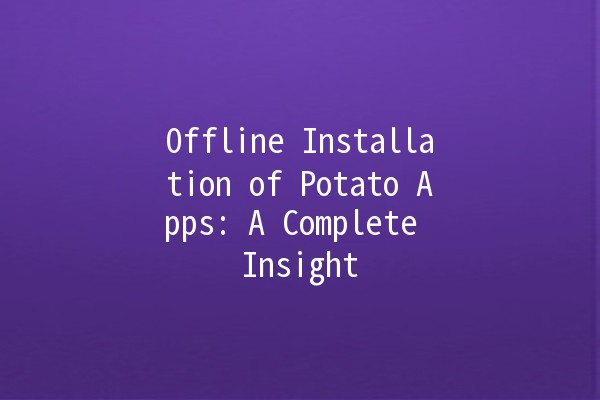In the everevolving landscape of software applications, the ability to install applications offline is a necessity for many users. With the rise of Potato, a lightweight application manager that simplifies app installations, knowing how to perform offline installations has become particularly important. This article will delve into the practical aspects of offline installs for Potato applications, offering productivityenhancing tips, addressing common challenges, and ensuring that you're equipped with the knowledge to streamline your installation process.
Understanding Potato Applications
Potato applications are designed for ease of use and efficient management. They allow users to install, update, and remove applications seamlessly. However, one of the most appealing features of Potato is its ability to facilitate offline installations, making it a vital tool for users with limited internet access or those who prefer not to rely on a continuous connection.
What Is Offline Installation?
Offline installation refers to the process of installing software or applications without needing an internet connection. For Potato applications, this means you can download all necessary files beforehand and install them anytime, ensuring smooth operations regardless of connectivity issues.
Preparing for Offline Installation
Step 1: Downloading Potato Application Files
The first crucial step in offline installation is obtaining the necessary application files. Here’s how to do it effectively:

Step 2: Organizing Your Files
To simplify the installation process, organize your downloaded files into a dedicated folder. This will help you locate everything easily during installation and avoid confusion, especially if you’re handling multiple applications.
Five ProductivityEnhancing Tips for Offline Installation
Tip 1: Create a Backup
Before beginning the installation of any Potato application, create a backup of your system or important files. This can save you from potential data loss in case something goes wrong during the installation. For example:
Utilize backup software to create a restore point.
Copy essential files to an external drive or cloud storage.
Tip 2: Test the Installer on Another Device
If possible, test the offline installer on another device with a similar setup. This ensures that your installer works correctly and allows you to troubleshoot any issues before going ahead with the main installation.
Set up a virtual machine for testing purposes.
Ensure all dependency files are correctly installed prior to your main installation.
Tip 3: Utilize Command Line for Advanced Features
Many Potato applications come with commandline options that can enhance the installation process. Familiarize yourself with these commands to customize installations, roll back changes, or automate tasks.
For example:
```bash
potato install appname offline
```
This command will initiate the app installation without requiring an internet connection.
Tip 4: Keep Your Software Updated
While performing offline installations, keep in mind that the installed applications may not automatically update. Regularly check for updates for your offline installers to ensure you have the latest features and security patches.
Follow the official Potato updates page or subscribe to their newsletter.
Maintain a checklist of installed applications and their version numbers.
Tip 5: Document Your Process
When installing several applications, documenting your process can alleviate confusion in the future. Create a simple log that includes:
Application names and versions.
Installation dates.
Any specific installation commands used.
This will be beneficial for future reference and reinstallations, especially for those frequently used apps.
Common Challenges in Offline Installations
Challenge 1: Missing Dependencies
One of the most common issues during offline installations is missing dependencies. Applications often depend on additional libraries, and failing to include these can result in installation errors.
Solution:
Always check the application requirements on the Potato website.
Consider using dependencychecking tools to identify any missing components before proceeding with the installation.
Challenge 2: Version Compatibility
Sometimes, downloaded application versions may not be compatible with your operating system or other installed software.
Solution:
Verify the compatibility of the application with your operating system before downloading.
Utilize compatibility mode settings if necessary.
Challenge 3: Limited Storage Space
Offline installations can sometimes take up substantial storage space, leading to challenges if your system is low on disk space.
Solution:
Calculate the total storage requirements of all applications before installing.
Clean up unnecessary files on your device beforehand.
Addressing Common Queries
Yes, you can download the offline installer and use it on multiple devices as long as the licensing permits it. Always check the licensing agreement for constraints.
If an installation fails, check the installer log for error messages. Also, verify if all dependencies are met and ensure there is enough storage space.
Regularly visit the Potato official website to download the latest versions of your offline installers. You can also check for updates periodically.
Most Potato applications allow you to roll back to a previous version if an issue arises. However, you must have the installation files saved prior.
Yes, some advanced software allows you to bundle multiple applications into a single offline installer. Look into tools that support this feature for convenience.
Always organize your downloaded files, create backups, document your installation procedures, and keep an eye on application updates and dependencies.
Understanding how to perform offline installations for Potato applications provides users with significant flexibility and control over their software management processes. Armed with practical tips and techniques outlined in this guide, you're now equipped to handle offline installations effectively. Stay proactive in managing your applications, and always keep the lines of communication open with the Potato community to share experiences and solutions. Happy installing!